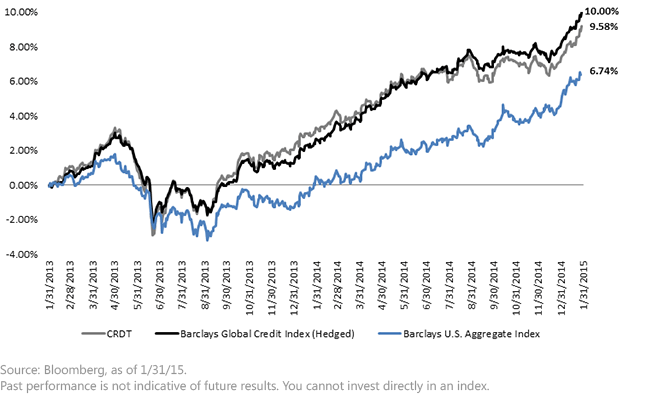WisdomTree Strategic Corporate Bond Fund (CRDT) Outperforms 90% of Peers


 For current performance of CRDT, click here.
#1: Team-Based Approach That Identifies Value
Western’s key investment philosophy hinges on long-term, fundamental value and diversification. What this means is that it tries to combine the fundamental view of a security with the security’s pricing in the marketplace. Identifying dislocations between fundamentals and prices is its definition of value. As a result, since Western has done its homework on the way in, it’s easier to have conviction to stay invested. If current market pricing drops, and the fundamental value view has not changed, then Western would potentially add to the position or strategy. A perfect example of this process in practice is investments in the debt of certain banks in the U.S. In the last few years, many banks have spun off noncore businesses and reduced debt. While earnings may have recently disappointed equity markets,3 continued deleveraging and back-to-basics banking are clear positives for investing in their debt.
#2: Combination of Top-Down & Bottom-up Analysis
Top-down analysis often refers to the macroeconomic view: Which countries and sectors look attractively priced? Bottom-up analysis looks at the underlying fundamentals of a specific issuer compared to its competitors. You can see the integration of the top-down and bottom-up processes when you look at the structure of Western’s trading floor. Analysts, traders and portfolio managers (PMs) all sit next to one another on the floor to exchange ideas. On the desk, the analyst role is not considered a junior position or a necessary rotation on the path to becoming a PM. In fact, this role is generally considered a career-track position. Analysts are able to take ownership of a specific trade idea from the very early stages all the way through implementation and monitoring.
In a largely policy-driven market, macro strategies are extremely important, particularly in terms of being a complement, or hedge, to some of the positions in the portfolio. Every week, the U.S. Broad Strategy Committee at Western discusses interest rates, broad sector allocation and potentially even some subsector allocations. Each of the sector heads on the Committee, which is chaired by Western CIO Ken Leech, plays a major role in debating market views and portfolio composition. Throughout most of 2014, Western’s view was that longer-term interest rates would remain contained or fall. As a result, CRDT’s portfolio was invested in slightly longer-duration securities than its performance benchmark.
#3: Global Approach to Credit
As we have mentioned previously, investing in stocks and bonds has evolved into a global pursuit. As of December 31, 2014, a full 60% of the investable universe for credit is domiciled outside the United States.4 It is important to remember that many of these foreign bonds are denominated in U.S. dollars and constitute sizable portions of index-based strategies that many investors may already unknowingly have exposure to in their portfolios. However, all risks are not created equal.
By taking a global view of credit, the team at Western is able to think strategically about what risks around the world are ultimately worth taking. This global approach is complemented by having boots on the ground in major market centers around the world. Having local affiliate offices managing money represents one way to understand potential drivers of return and identify future risk and opportunities. At the beginning of 2015, Western had 47 research analysts covering markets around the world. 2014 saw a sharp differentiation in performance across sectors and quality. Going forward, we believe a large, experienced analyst pool will prove extremely beneficial in taking advantage of the greater opportunities this differentiation has created.
Ultimately, effective bond managers are only as good as their investment process. As we have outlined in this piece, we believe Western’s approach to fixed income can be a valuable resource to investors seeking to navigate the evolution of global credit markets.
1Western sub-advises five WisdomTree Funds, as of 12/31/14.
2Source: Morningstar, as of 12/31/14. For the 1-year period, CRDT ranked 75th out of 405 funds, beating 82% of its peers.
3Source: Bloomberg, as of 1/20/15.
4As represented by the Barclays Global Credit Index, as of 12/31/14.
For current performance of CRDT, click here.
#1: Team-Based Approach That Identifies Value
Western’s key investment philosophy hinges on long-term, fundamental value and diversification. What this means is that it tries to combine the fundamental view of a security with the security’s pricing in the marketplace. Identifying dislocations between fundamentals and prices is its definition of value. As a result, since Western has done its homework on the way in, it’s easier to have conviction to stay invested. If current market pricing drops, and the fundamental value view has not changed, then Western would potentially add to the position or strategy. A perfect example of this process in practice is investments in the debt of certain banks in the U.S. In the last few years, many banks have spun off noncore businesses and reduced debt. While earnings may have recently disappointed equity markets,3 continued deleveraging and back-to-basics banking are clear positives for investing in their debt.
#2: Combination of Top-Down & Bottom-up Analysis
Top-down analysis often refers to the macroeconomic view: Which countries and sectors look attractively priced? Bottom-up analysis looks at the underlying fundamentals of a specific issuer compared to its competitors. You can see the integration of the top-down and bottom-up processes when you look at the structure of Western’s trading floor. Analysts, traders and portfolio managers (PMs) all sit next to one another on the floor to exchange ideas. On the desk, the analyst role is not considered a junior position or a necessary rotation on the path to becoming a PM. In fact, this role is generally considered a career-track position. Analysts are able to take ownership of a specific trade idea from the very early stages all the way through implementation and monitoring.
In a largely policy-driven market, macro strategies are extremely important, particularly in terms of being a complement, or hedge, to some of the positions in the portfolio. Every week, the U.S. Broad Strategy Committee at Western discusses interest rates, broad sector allocation and potentially even some subsector allocations. Each of the sector heads on the Committee, which is chaired by Western CIO Ken Leech, plays a major role in debating market views and portfolio composition. Throughout most of 2014, Western’s view was that longer-term interest rates would remain contained or fall. As a result, CRDT’s portfolio was invested in slightly longer-duration securities than its performance benchmark.
#3: Global Approach to Credit
As we have mentioned previously, investing in stocks and bonds has evolved into a global pursuit. As of December 31, 2014, a full 60% of the investable universe for credit is domiciled outside the United States.4 It is important to remember that many of these foreign bonds are denominated in U.S. dollars and constitute sizable portions of index-based strategies that many investors may already unknowingly have exposure to in their portfolios. However, all risks are not created equal.
By taking a global view of credit, the team at Western is able to think strategically about what risks around the world are ultimately worth taking. This global approach is complemented by having boots on the ground in major market centers around the world. Having local affiliate offices managing money represents one way to understand potential drivers of return and identify future risk and opportunities. At the beginning of 2015, Western had 47 research analysts covering markets around the world. 2014 saw a sharp differentiation in performance across sectors and quality. Going forward, we believe a large, experienced analyst pool will prove extremely beneficial in taking advantage of the greater opportunities this differentiation has created.
Ultimately, effective bond managers are only as good as their investment process. As we have outlined in this piece, we believe Western’s approach to fixed income can be a valuable resource to investors seeking to navigate the evolution of global credit markets.
1Western sub-advises five WisdomTree Funds, as of 12/31/14.
2Source: Morningstar, as of 12/31/14. For the 1-year period, CRDT ranked 75th out of 405 funds, beating 82% of its peers.
3Source: Bloomberg, as of 1/20/15.
4As represented by the Barclays Global Credit Index, as of 12/31/14.Important Risks Related to this Article
There are risks associated with investing, including possible loss of principal. Foreign investing involves special risks, such as risk of loss from currency fluctuation or political or economic uncertainty. Investments in emerging, offshore or frontier markets are generally less liquid and less efficient than investments in developed markets and are subject to additional risks, such as risks of adverse governmental regulation and intervention or political developments. Derivative investments can be volatile, and these investments may be less liquid than other securities, and more sensitive to the effects of varied economic conditions. Fixed income investments are subject to interest rate risk; their value will normally decline as interest rates rise. In addition, when interest rates fall, income may decline. Fixed income investments are also subject to credit risk, the risk that the issuer of a bond will fail to pay interest and principal in a timely manner or that negative perceptions of the issuer’s ability to make such payments will cause the price of that bond to decline. Unlike typical exchange-traded funds, there is no index that the Fund attempts to track or replicate. Thus, the ability of the Fund to achieve its objective will depend on the effectiveness of the portfolio manager. Please read the Fund’s prospectus for specific details regarding the Fund’s risk profile. Diversification does not eliminate the risk of experiencing investment loss. Foreside Fund Services, LLC is not affiliated with Western Asset Management or Morningstar. 2015 Morningstar, Inc. All Rights Reserved. The information contained herein: (1) is proprietary to Morningstar and/or its content providers; (2) may not be copied or distributed; and (3) is not warranted to be accurate, complete or timely. Neither Morningstar nor its content providers are responsible for any damages or losses arising from any use of this information. Past performance, rankings and ratings are no guarantee of future results. The Percent Rank in Category is the funds' total-return percentile rank relative to all funds within the same Morningstar Category and is subject to change each month. Regarding number of funds, 1 = Best and 100 = Worst. The rankings do not take into account the effects of sales charges.


